Moving Forward
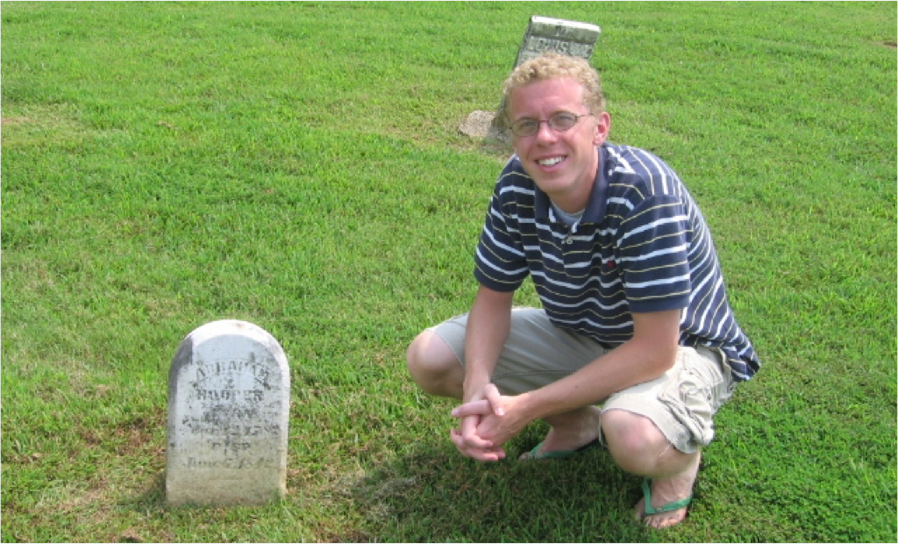
By Jonathan Arnell
Adapted from remarks at a Sunday evening gathering sponsored by The Hearth, an inclusive LDS community of LGBT Mormons and the people who love them, based in the San Francisco Bay Area.
The first thing I want to say is thank you to everyone who’s here tonight. There are people here who I know from a lot of different places, and I feel the way you care for me by being here. I have a couple of friends from a study abroad in Jerusalem. Some people I know from church, from my ward. My bishop in my new ward is here. And one friend from my mission. Then other people are here who I may not have met, or who I know from other places.
I’m here just to talk about my perspective. I don’t have any credentials other than being gay. That’s why our host, in introducing me, all he could talk about was what he likes about me. Because I haven’t done anything. I’m here because I have things to say, but I don’t have any authority.
Bigger
I’d like to start out with this photo, because to start out this conversation about homosexuality and the church, and my experience, I like to go back to this place where I know that everything is bigger than me. Not just bigger than me—bigger than anyone. Bigger than anything that has ever been said, anything that has ever been seen, or observed. It’s all bigger.
We have these amazing images from the Hubble telescope, which are crazier than anything that we could have imagined before we had the images coming in. We’re learning that things are bigger and more impressive than we knew before we observed them. In fact, not too long ago—a few months ago—there was this amazing experiment where gravity waves were measured by physical instruments. Which doesn’t really mean anything to me (I don’t know what it means), but people who knew said it was incredible.
Going into this conversation, it starts to feel like this is really big, like we’ve got to figure this out. It feels very heavy and weighty. And it is, but what is out there, and what actually matters, is way bigger than what we’re talking about. So what I hold onto through all this is the bigger thing. I start with the bigger thing and then I say, “Okay, let’s zoom in a little bit—actually a lot—and talk about something smaller.
We have in scripture some words that start to touch upon the bigness of it. In John it talks about The Beginning:
In the beginning was the Word, and the Word was with God, and the Word was God. The same was in the beginning with God. All things were made by him; and without him was not any thing made that was made. In him was life; and the life was the light of men. And the light shineth in darkness; and the darkness comprehended it not (John 1:1-5).
The first thing to think about here is that God was in the beginning, and everything that has happened since then, He witnessed it. He saw it all. Another thing is that “without him was not anything made that was made.” So everything that’s made, God was involved. Every person that’s born, God was involved in getting that person born. I don’t mean that it’s all deterministic and that God controlled every little bit of that. But whatever happened, He either wanted it to happen or He let it happen, knowing that it would all turn out okay. The last thing is that “the light shineth in darkness; and the darkness comprehended it not,” so even though there’s this light permeating everything, sometimes it is not comprehended. It’s just totally misunderstood. But the light is still there.
My Story
I tend to think in a long timeline. When I think about myself, I don’t like to begin where I began. So I’d like to go back a little bit to some of my ancestors. There was this guy named Abraham Hooper who was in North Carolina, and he had a son named James Hooper. We didn’t know very much about the family a while back. All that I knew was that James had originated in North Carolina, had moved into Indiana, and then had ended up in Salt Lake, in the church, at some point. I was curious to find out what got him to the church, so I did a lot of investigation and ended up finding out that he had been a Baptist minister in Indiana, and that at some point this letter was written to John Brown, who was the mission president over the mission that included Indiana:
President’s Office
Gt. Salt Lake CitySept. 20th, 1867
Elder John Brown,
care of Mr. Benjamin Crain,
Du Quoin, Ills.Dear Brother:
I wrote you on the 19th inst. There has nothing new transpired since I then wrote. I write now to you to give you the name of a gentleman, who has written two letters to me some little time ago, making inquiry about coming to Utah (he passed through here once) and also about an Elder visiting that part of the country. He is the Rev. James Hooper, Wheatland, Knox Co., Indiana. It may be convenient for yourself or one of the Elders to visit this gentleman’s section; if so, it may be productive of good.
With Love, Your Brother,
Brigham Young
(Courtesy LDS Church Archives)
I have lots of ancestors, and they all have their own stories, and I consider this to be the beginning of one of the branches of my story.
I was born October 14, 1986. This is a card that my mom received when I was born:
They named me Jonathan, which means “gift of Jehovah.”
On the same day I was born, it was announced that Elie Wiesel would receive the Nobel Peace Prize. This is what the committee wrote about him when they announced it:
The Norwegian Nobel Committee has resolved that the Nobel Peace Prize for 1986 should be awarded to the author, Elie Wiesel. It is the Committee’s opinion that Elie Wiesel has emerged as one of the most important spiritual leaders and guides in an age when violence, repression and racism continue to characterise the world.
Wiesel is a messenger to mankind; his message is one of peace, atonement and human dignity. His belief that the forces fighting evil in the world can be victorious is a hard-won belief. His message is based on his own personal experience of total humiliation and of the utter contempt for humanity shown in Hitler’s death camps. The message is in the form of a testimony, repeated and deepened through the works of a great author.
Wiesel’s commitment, which originated in the sufferings of the Jewish people, has been widened to embrace all repressed peoples and races.
The Norwegian Nobel Committee believes that Elie Wiesel, with his message and through his practical work in the cause of peace, is a convincing spokesman for the view of mankind and for the unlimited humanitarianism which are at all times necessary for a lasting and just peace.
Oslo, October 14, 1986
(From http://www.nobelprize.org/nobel_prizes/peace/laureates/1986/press.html)
I’ve been going through and archiving all my old papers, and I found some that are just awesome. When I was in Kindergarten, we got awards. I got an award for being “very responsible” and for being “the best thinker.” I look back now and think, “I don’t know if my teacher should have written that. That’s kind of pitting kids against each other.”
I wrote this poem in first grade for a contest:
I think I thought that rhymed. You can see there is an outline where there was some paper that got cut out and there is some new paper behind it. The story was, I wrote this the night before I was supposed to turn it in. I woke up the next morning and some food had been spilled on it. There are some signs of it still—you can see some little grease stains. I started bawling. So my mom came and said, “It’s going to be fine.” She helped me cut out the words—which is what I needed to turn in, I didn’t need the rest of it—and then we pieced it back together in a way that I could then turn it in.
I was baptized on October 16, two days after my birthday. I was baptized in the same meeting as my best friend. He had turned eight a few weeks before me and had waited so we could get baptized together.
This is my final report card for seminary. I don’t know if they have it listed for the whole year, but you’ll see all zeros in Absences. I never missed a day of seminary in four years. There were even days that I was sick and couldn’t go to school, but I went to seminary and then went home and slept. You’ll see the 6 and the 5 in tardies. That is an underestimate. I was late every day. I would get out of bed at 5:55, I would leave my house at 6, and I would get there at 6:03 or so.
This is a Plan of Salvation that, I think, I took notes on in seminary. You can see that I was not interested in going to Outer Darkness.
After I got through high school, I went to a semester of school at BYU, then I went to my mission in Argentina. I might be better for me to not get started on Argentina, because I would just keep going.
I did a study abroad in Jerusalem. I’ll tell you the story of this picture (because I love crying). This was our first time in the Garden Tomb. We sat as a group and sang Easter Hymns, and we sang “I Believe In Christ.” You’ll remember that in the last verse it says, “From him I’ll gain my fondest dream.” I believed it in that moment.
The Life of Christ
I want to talk a little bit about some of my favorite scriptures from the life of Christ. I may not be able to entirely explain exactly why they mean so much to me, but in some ways I will be able to.
Consider the lilies of the field, how they grow; they toil not, neither do they spin….Wherefore, if God so clothe the grass of the field, which to day is, and to morrow is cast into the oven, shall he not much more clothe you, O ye of little faith? (Matthew 6:28,30).
This scripture means a lot to me because I think that Jesus really meant it. I think He really meant, “Consider these lilies. Think about how they live. And they’re okay. God takes care of them. So if He’s going to take care of them, He’ll take care of you. Even if you have little faith.”
And Jesus saith unto him, The foxes have holes, and the birds of the air have nests; but the Son of man hath not where to lay his head (Matthew 8:20).
I love that scripture, one, because it’s very poetic and I just love the sound of it. I love the idea that one of the things that Jesus understands is not having a place.
And his disciples asked him, saying, Master, who did sin, this man, or his parents, that he was born blind? Jesus answered, Neither hath this man sinned, nor his parents: but that the works of God should be made manifest in him (John 9:2-3).
That’s a good one.
Philip findeth Nathanael, and saith unto him, We have found him, of whom Moses in the law, and the prophets, did write, Jesus of Nazareth, the son of Joseph.
And Nathanael said unto him, Can there any good thing come out of Nazareth? Philip saith unto him, Come and see.
Jesus saw Nathanael coming to him, and saith of him, Behold an Israelite indeed, in whom is no guile!
Nathanael saith unto him, Whence knowest thou me? Jesus answered and said unto him, Before that Philip called thee, when thou wast under the fig tree, I saw thee (John 1:45-48).
This one—it’s a little hard to explain why I like it. This represents to me that God is eternally aware of us, and that before I became aware of my own problems, before I became aware of even myself, God saw me. He already knew.
A friend of mine also did a study abroad in Jerusalem. She was looking out over Jerusalem and feeling some deep emotions about the conflict in the Middle East and how people could be so horrible to each other. She had this moment where the message came from God, “I already knew about this long before you, and I loved them before you knew they existed.”
I also love the story of the woman taken in adultery, but I don’t have time for it at the moment.
Love
I read the book Proof of Heaven at a key time in my life. I know not everyone loves near death experience stories. I’m obsessed with them. I consider my experience reading this book to be the foundation of my testimony of the existence of God, and of the character of God. I have it here, and I’d like to read a passage. This man is essentially on the other side. He’s died, and he later comes back. He says,
…I had already been taught the one thing—the only thing—that, in the last analysis, truly matters. I had initially received this piece of knowledge from my lovely companion on the butterfly wing upon my first entrance into the Gateway. It came in three parts, and to take one more shot at putting it into words (because of course it was initially delivered wordlessly), it would run something like this:
You are loved and cherished.
You have nothing to fear.
There is nothing you can do wrong.
If I had to boil this entire message down to one sentence, it would run this way:
You are loved.
And if I had to boil it down further, to just one word, it would (of course) be, simply:
Love.
Love is, without a doubt, the basis of everything.
(Eben Alexander, Proof of Heaven, pp. 70-1)
That was the essentially the last time I was afraid of God.
The Policy
I’m going to jump from all of this to November 5 of last year, when it was announced that there were some new policies that were going to apply to same-sex couples and their children. There were three specific points. One was that cohabiting couples would have optional discipline, for married couples it was mandatory discipline, and the children of same-sex couples would not be able to receive baby blessings, and they wouldn’t be able to be baptized until they were at least 18, and they disavowed the practice of same-sex marriage, and they were out of their parents’ home.
To understand the feelings that were attached to this, you have to think about it a little bit in context. One thing that was happening during 2015 is that there was this feeling that things were warming up, that things were getting better and more welcoming. In January of 2015, there was this press conference where the leadership of the church announced that they were supporting some nondiscrimination legislation. In June, there was a ruling called the JONAH ruling where there was this organization that provided reparative therapy, orientation change therapy, and it was ruled that they had promised things that they couldn’t deliver on.
In June was Obergefell v. Hodges, which guaranteed the legal right to same-sex marriage in the United States. In response to that, the church sent out a letter clarifying or reiterating the church’s position. In a lot of places throughout the church there were discussions that followed that in church. They suggested reading it in a meeting other than sacrament meeting. As a result, it happened many times in the third hour, so people actually talked about it. I heard reports that the discussions were very good.
In July, the church made a donation to the Utah Pride Center to help with homelessness, because especially in Utah a high percentage of homeless teens are LGBT. In July of that year, the Boy Scouts of America allowed gay leaders. The church then said they had to reconsider their relationship with the Boy Scouts, but then they ended up saying, “Fine, we’re okay.” In September, Elder Rasband gave an amazing devotional at BYU where he essentially said, “I want you all to get to know people who disagree with you, and who you don’t understand, and listen to them.”
In October, Elder Holland gave his “Behold Thy Mother” talk, where he told a story of a young man who was same-sex attracted, went on his mission, and had to come home because of some emotional trouble. His mother then suffered through several years with him, and then he eventually was to a place where he was healthy enough to go back to his mission and finish it. Elder Holland made a couple of very important points in that talk. One was that he said that this young man was always worthy, that through the whole process he had been worthy. He also commented that this young man, in the interim between coming home from his mission and going back, that he was teaching seminary. To some people, it would have been unclear whether a gay person could teach seminary, and it makes the point that, yes, that’s okay. And then it also made the point that he was good to go back on his mission, even after everyone knew that he was same-sex attracted.
Also in October, Elder Oaks essentially said Kim Davis was wrong by not authorizing same-sex marriages in her area. Then again in October, there was the World Congress of Families, which a lot of people are not fans of, but during that meeting, Elder Ballard actually called for more mutual understanding and less harsh rhetoric.
So overall things were feeling better, and things were feeling more welcoming, and then—one person described that when the policy came out it felt like whiplash. So that’s one reason that it felt particularly harsh.
The way that it was communicated that day, at least the way I first saw it, was in a Facebook post. I think it was also shared on Reddit at that same time. It then ballooned, there were news articles written on it, then Friday evening, the next day, Elder Christofferson did an interview where he explained it. Then a week later, there was a clarification provided that—there were some questions that had arisen and it specified that in some cases it didn’t apply in ways that people were worried it did.
In my personal experience, I saw this Facebook post about an hour after it was posted. Like a lot of people, I first thought there was no way it could be true. Then I followed the discussion, and as soon as the first legitimate news article was written about it, I thought, “Oh, this is real.” I was mad and thought it was kind of dumb, but it didn’t hit me in my gut. Then a friend contacted me, and he said, “Oh, did you hear the news?” and I said, “Yeah, I’m pretty mad about this.” Then he said, “I can’t believe the thing about the kids.” And I said, “What thing about the kids?” Then I found out the thing about the kids, and I felt as if I was going to throw up.
Moving Forward
In the course of this whole time, it was pretty hard for me, but there were a couple of things that helped me. One thing was this song called “Moving Forward” by Israel Houghton. These are the lyrics:
What a moment You have brought me to
Such a freedom I have found in You
You’re the healer who makes all things newI’m not going back, I’m moving ahead
Here to declare to You my past is over in You
All things are made new, surrendered my life to Christ
I’m moving, moving forwardYou have risen with all power in Your hands
You have given me a second chance
Hallelujah, hallelujahYou make all things new
Yes, You make all things new and I will follow You forward
It repeats some of the lyrics several times. If you know Christian rock—I love Christian rock. But it just says the same things over and over, so you don’t necessarily have to listen to the whole song. I listened to this song for several weeks on repeat.
Then there’s this phrase, “Be Brave.” This woman, one day, on campus she put up a sign that said, “Be Brave.” She made it out of paper and yarn and stuff, and she put it up. I had no idea who had made it. She put up this sign that just happened to be on my bike ride onto campus. And she put it up right around the time of the policy. So the first time I saw it, I thought, “Wow. This is a message for me. I gotta be brave. I gotta keep going.” And I passed that every day going onto campus for several months. There were several times that I felt like it was just for me. Then I found months and months later that it was made by a woman in our stake, who I respect a lot.
My Response
In order to express what I was feeling at the time, I wrote an essay that I called “Despise Not the Revelations.” What was going through my mind and my heart in all this, is this idea of “What can I do to make people get it? People just don’t seem to get what’s going on in my life, and what I actually feel.” I felt mischaracterized. I had heard several times the phrase, “You know, I understand it’s difficult, but we can’t do anything until we receive more revelation.” I had this feeling like, “We’re getting revelations.” So I wrote this:
I saw this phrase first on the door of a Catholic parish in Santa Fe, Argentina: “Every child that is born is proof that God has not yet given up on human beings.” The idea appealed to me at the time, both because babies are adorable and because as a missionary I had a daily habit of giving up on humanity. An element of that phrase has been working on me in the nearly 10 years since: the idea that people enter the world bearing divine information—that we are each a revelation.
Jesus is the ultimate example. We call Him the Word of God. That title evokes the idea that God spoke and the information that came out was Jesus, or that God wrote and the ink on the page spelled out Jesus. He came to earth, in a sense, as a projection of the mind and heart of God in human form. He is the personification of the fullness of divine revelation. All the visions of all the prophets could not express the depth and breadth and height of the love of God. Only Love in physical form would suffice.
Perhaps Heaven has deposited in each of us a message for the world. We may not be THE Word of God, but each of us may be A Word of God. We are each a part of a divine story, a holy message about what is, what was, and what will be. Though I’m sure I’m not a terribly important word in that story, it is not complete without me, and it will never be complete until I release myself into the world. The only way to contribute my part, the revelation that God deposited inside me, is to live my life as me…
(Published at By Common Consent, https://bycommonconsent.com/2015/11/13/despise-not-the-revelations/)
My feeling was that there are people being born in this way that we don’t really understand, and people are turning to God, saying “Tell us what these people are about. Tell us what this is about, what these people are experiencing.” And I felt that we, as a people, needed to be more ready to go to those people, and say, “What revelation has God passed through you to the world?”
Similarities
What I did in response to, or as a follow-up to, this policy is I collected lots of the conversations in blog posts that were being written, both people defending it or supporting it, and people who were against it. For me, more than anything, what I saw following this announcement was that the Body of Christ was alive. That people were feeling things and saying things. So I wanted to figure out what is going on within us. So I collected a bunch of blog posts, then I went through and I looked at which ones were shared the most or most widely read, which ones were most articulate, and then which ones I liked. Then I put them all together into this 200-page collection of responses to the policy. There’s a range of opinions and a range of thoughts. A lot of interesting things that I hadn’t thought of before.
In preparation for this meeting tonight, I went through and I asked, “So what is going on in the undertones? What are the undertones to this conversation? And in particular, what is it that we are all agreeing on, or in what way are we approaching the problem in the same way?” What I found is there are a lot of ways that we approach the questions in a similar way, and then diverge. But there’s an original agreement on how to start. So I’d like to look at some similarities.
The first thing was that people were sharing their initial responses. That may seem obvious, but to me that suggests something—that people feel like the way they felt about hearing about it mattered, that there was something to be learned by how it first hit you. Very interestingly, across the board, both the people who defended or were supportive of it and those who were not, everyone felt jarred at first. There were a lot of people that said, “I first saw it and I thought, oh that can’t be! Then after thinking about it a while I realized, oh, this is a great thing.” But across the board, there was nobody that said, “I heard that and I was like, ‘Finally! Finally we got rid of them!’” Which is amazing. It’s incredible, and that wouldn’t have been true in years past. Nobody said, “Finally, they’re gone!”
There was also an agreement that this carried weight, that this was something that mattered. Granted, this is a biased observation because the people who didn’t care wouldn’t have written anything. But even with people who felt a range of opinions, everyone felt like what was happening right now was significant, and that it was something that was important that we needed to think about and work out.
Everyone appealed to scripture. Maybe as a Christian and as a Mormon it’s kind of an assumption that scriptures matter, but even in this modern situation there was an agreement on all sides that we needed to think about how this compared to what has been said before, and what has happened before. There’s disagreement about which scriptures apply and how they apply, but we all went back to the same body of scripture. It’s pretty fascinating that, within this tradition, even people who disagree, they all have this same basket of words that they use to explain what they believe. There weren’t a lot of people saying, “This is what the Talmud says” or “This is what the Quran says.” There’s an understanding that we’ve got to be able to use the same language. Then from there, it diverges.
There was also a lot of discussion of comparable scenarios. A lot of people were saying, “You know, this is pretty similar to this other way that the church works.” For example, a lot of people brought up initially the case of polygamous families. They said, “This is identical to the way that children of polygamous families are treated.” Several times people brought up, “This is similar to the way people from Islamic cultures, or from Muslim families, are treated.” There’s a worry that they might have a risk to their life if they join the church. So people raised that. But there was this idea that there should be some consistency, and that we should think about whether this is the same or different from how the church works in other situations.
Judgment was withheld, in everything that I saw, about gay people. With everyone that was saying, “This policy is good,” or “This policy is bad,” no one said, “Gay people are bad.” I just didn’t see that. What you did see is people saying unorthodox people are bad, or people who are against this policy are bad, which I don’t like. But no one was saying, “I don’t like gay people.”
There was an agreement about the importance of family. People who were concerned were concerned that it was going to tear apart families, and people who were supportive felt that it was good because it was keeping families together. Either way, people felt that keeping the family together was important, and it was just a disagreement on whether it would, or not, keep families together. There was also disagreement about what the ideal family is, but there wasn’t much language about “so-called” marriage or “so-called” families. People were ready to admit that same-sex parents with children are a family, which is an interesting thing to notice.
There was an acknowledgment that pros and cons matter, and pretty widely there was an acknowledgment that there were both, that there were some things that were going to come out of this that were not going to be great, and that some things were going to be better. There was a disagreement about how the balance worked out, but there was an agreement that there was a scale, that we were supposed to be weighing these things, and that the way to go would be whichever way it leaned. So you would have people who were supportive saying, “Some people might be hurt by this, and I understand that people are feeling pain. But on the other hand, this is how this is actually making their lives better.” What you didn’t see a lot of is people saying, “You know what, this has been done, and it doesn’t matter how it affects people. It’s right.” Which is an interesting idea. If you think about the foundations of ethics, it sounds very utilitarian, like there is an agreement that it matters what good comes out of a decision.
There was also a lot, on every side, of taking a step back, and saying, “But what are we about? What is the church about?” And we kind of disagree. This is something that I run into a lot when I try to talk to people about things in the church. It’s like we grew up in the same church but we didn’t hear the same thing, or we didn’t hear it in the same way. I was sitting in the same seminary class with these people every day for four years, and we came out having learned completely different lessons from the same words. But there’s this understanding that, in order to make sense of this event, we need to step back and say, “Okay, what are we about?” I think that’s a very healthy thing. But again, people disagree on the heart of Mormonism, what it’s really about.
One thing that I loved was that lots and lots of people—I’d say the majority—after they were done talking about the concept or the technical side of the policy, they said, “Okay, what now? At the end of the day, it’s my job to comfort people. It’s my job to welcome people.” That’s a beautiful thing, and maybe a new thing. I think it’s something we are learning as a people, that we maybe didn’t get in previous times. We’re learning that there are certain things that we need to live as a people that come above doctrinal differences.
There was also an agreement that the source matters, as in who made this decision. A lot of people who were against it were saying, “Who decided this? Because I’m sure that everyone didn’t agree. I’m sure this apostle didn’t agree.” And other people were saying, “It came from the apostles, so it’s right.” But there was always the idea that it mattered who said this and who made this decision. Sometimes people would ask how the decision was made, and they sincerely wanted to figure out how to feel about it based on how it was made. I would say that more of the time, people were saying, “I can bet you it was done this way, because I’m sure I’m right about what I think about it.”
This is my cynical side coming out on this point. We all love using whatever assumptions or evidence are convenient to us at a certain time. To give you an example, there was lots of discussion about, “These kids aren’t going to get baptized when they’re eight, but it’s not a big deal. Just let them wait 10 years.” You know, like they’re not going to lose anything eternally because they had to wait 10 years. Whereas, if you were in my mission, you did not let those investigators wait an extra day if they’re ready to be baptized. They needed it now. It seems like we pick and choose what we’re going to emphasize at one time versus the other based on what conclusion we want to reach, whereas if we were fair we would need to acknowledge that we’re being inconsistent. I do things like this all the time.
Differences
There were some differences in the way things were approached, which I find fascinating. There’s this question of scope. How widely should rules apply? At what level should they be decided? Some people sort of take it for granted that in a universal church, in a global church, everyone should just have the same rules. That’s the assumption that I grew up with. Other people thought more about this and said things like, “Is that actually the level where these decisions should be made, or would we be better off letting certain decisions be made in a local level where people know each other personally?” I say this is a difference because some people don’t even think this is a valid question to ask, and other people do.
There was also disagreement about whether the appearance of the policy mattered. You have the actual application and the actual details, and then you have the message that it sends. Some people don’t think that the message really matters. It’s like, “This is just a rule. It doesn’t mean anything about those people. It doesn’t say anything. It doesn’t communicate any ideas.” Then other people say, “That’s the biggest thing about it, is what it communicates.” So there’s some disagreement about whether that actually matters. There was a lot of concern, especially on the part of those who are against it, about how it would look to the world, whereas people who support it said, “That doesn’t matter. We’re not here to be popular.”
Some people were very worried, or very focused, on whether or not the intention was good behind the policy, and other people felt like, “It doesn’t matter what the intention was. The way it affects people is real. Even if there were good intentions, it’s a bad effect.”
There was also a lot of talk of policy versus doctrine. For some people it’s a really big idea. It’s like, “This is policy, not doctrine,” and that to them is this huge idea. To other people, it’s like, “Either way, it’s what the church is saying, so it either needs to be right or not.” There’s this assumption that some people have, it seems, that if something is expressed as doctrine, God will make sure it’s right and that it’s not done correctly, but if it’s a policy, God will let it go and let it be worked out over time.
Favorites
I’d like to share a couple of the things that, for me, felt like, “Oh yeah, you hit the nail right on the head there.” This first one is about the pain of being torn. This is written by Rosalynde Welch at Times and Seasons:
…but favoring the live-and-let-live approach outlined above and unconflicted about socializing with and celebrating gay families in my circle — is unstable. I want my cake — a robust culture of conjugal marriage and child-rearing to aid my children in finding mates and raising families — and I want to eat it, too — that is, I want to freely welcome all shapes and sorts within the walls of the church.
(Rosalynde Welch, “The Handbook Changes from the Institutional Perspective”, Times and Seasons, http://timesandseasons.org/index.php/2015/11/the-handbook-changes-from-the-institutional-perspective/)
A lot of people are feeling torn in that way. It’s like, “I see why it’s so important to support traditional marriage, but I also want to welcome other people too.” And people feel torn, like, “How do I do both?” That expressed something that a lot of people feel.
There was this one message that I just love. I love the sentiment behind it. This was by Lon Young, who has a blog called Buddha in the Beehive.
For all who have left and are leaving, I understand. I love you. I know you have not left the path. For the true path is discipleship, and that may lead some of you to the leper, the lonely, and the outcast. He may lead you from gilded temples to soup kitchens, from mega-malls to homeless shelters. You may lose the upper seats in the synagogues, but you will recover your soul. And to those who stay, you too are disciples. You make sure there is space, even if you have to push the boundaries and stretch the tent cords to make room for everyone who shows up, no matter who they are and what others say about them.
(Lon Young, “To The Wounded and the Weary…”, Buddha in the Beehive, https://buddhainthebeehive.wordpress.com/2015/11/08/to-the-wounded-and-the-weary/)
I love that sentiment because there are a lot of people who leave, and they feel like that’s what they need to do, and there are a lot of people who stay, and they feel like that’s what they need to do. Elder Uchtdorf expressed it very well several conferences ago when he said that people leave for a lot of complicated reasons. I think the best thing we can do is just to trust the best intentions of everybody, regardless of the decisions they’re making.
This comes from Melissa Inouye at the blog Peculiar People:
The Church of Jesus Christ of Latter-day Saints and its members have had a bad weekend. These past few days have brought to the fore divisions over core interpretations of Christian community. People have taken to social media, email, and Sunday School to declare support or dismay, to report personal divine revelation both for and against the policy. They have ranted. They have wept. They have taken their concerns to God. How does it all work? How do our Heavenly Parents feel when their children fight over how to be good? I have no idea. Fortunately, as is the case with all eternal relationships–and as my Uncle Dillon would say–”the first million years are the hardest.”
(Melissa Inouye, “These Three Things Are True”, Peculiar People, http://www.patheos.com/blogs/peculiarpeople/2015/11/these-three-things-are-true/)
In a way, that’s the situation we’re in right now. I don’t think anyone wants to do bad. None of us want to do the wrong thing, but we just can’t seem to work out a way to all agree on what is good. So the experience is tough, but I think there’s good intentions behind it all.
Then, this is personally my favorite passage that I read. When people ask me, “Why are you still going to church?” it’s so hard for me to express. But Jana Riess wrote something on her blog Flunking Sainthood, that for me it hit the nail right on the head:
What has bothered me most about this week’s leavetakings is the pervasive language of purity and contamination. Some of the people who are leaving say they must go because they have been tainted by association. They cannot be seen as being in compliance with this new policy.
The problem is that this is exactly the same logic that appears to be motivating the leaders of the church: to have purity at all costs. When we are compelled by a drive for purity rather then a mission to love and to be inclusive of others — including those who disagree with us — we easily fall prey to separating ourselves from them, even demonizing them.
(Jana Riess, “A ‘mass exodus’ of Mormons? Maybe. But here’s why I’m not among them,” Flunking Sainthood, http://janariess.religionnews.com/2015/11/13/a-mass-exodus-of-mormons-maybe-but-heres-why-im-not-among-them/)
To me, that is a major driving force behind a lot of what I do. I am repulsed by this idea that I can’t be around people who disagree with me. To me, that is reality. Reality is that we are all humans. We all have our own minds, our own hearts, our own experiences, and inevitably we’re going to disagree. We’re different in so, so many ways, and that’s not a reason to separate from each other. That’s a reason to learn from each other. So I feel more motivated by the idea of being inclusive and welcoming people into my circle that are not like me, rather than trying to keep myself safe or pure by maintaining distance.
Community of Christ
Briefly now, I want to tell you about some things that I learned last weekend. I was in Independence, Missouri, for an Affirmation retreat. We joined with some people from Community of Christ. They have a fascinating history. They’re the ones that used to be called the Reorganized Church of Jesus Christ of Latter Day Saints. They began sort of as the group that didn’t go to Utah, the ones who stayed in Nauvoo.
There are these three dates that I’m going to talk about. One is 1984, and that’s when the prophet-president of the Community of Christ presented a revelation to their church saying that women were allowed to be ordained to the priesthood. It tore the church apart. I heard an estimate that about 25% of the church left at that point because they felt that it was wrong. We talked to two of the apostles of their church and it’s understood in the church that what they’re doing in the last few years is based on the lessons they learned from 1984.
In 2010—I may get these details wrong—I believe the prophet-president of the Community of Christ presented a revelation that said that they needed to have national conferences, which they had never had before. They had always had a global, international conference where things were decided as one group, and he presented this revelation saying that they needed to have national conferences so that countries, or the saints within certain countries, could make decisions that were best for their locality. It was in 2013 that the first USA conference was held. At that point, they voted to allow same-sex married couples to be welcomed in full fellowship in their church, that they would perform same-sex marriages, and that gay people could be in the clergy of the Community of Christ.
They’ve learned a lot of hard lessons about how to deal with disagreement in their church, especially since the big fallout from 1984. They now have this set of lessons that are official lessons taught in their church, about faithful disagreement. On the very first page of the lesson, they have this description of the Four Stages of Community, which are based on M. Scott Peck’s work. I find this description very pertinent to the experience that our church is having, and that organizations in general tend to have.
It starts out as pseudo community, where “the essential dynamic of pseudo community is conflict avoidance. Members are extremely pleasant with one another and avoid all disagreement.” Then, “Once individual differences surface, the group almost immediately moves into chaos. The chaos centers around well-intentioned but misguided attempts to heal and convert.” That is followed by a time of emptiness: “The way through chaos to true community is through emptiness. It is the hardest and most crucial stage of community development. It means members empty themselves of barriers to communication. The most common barriers are expectations and preconceptions; prejudices; ideology, theology and solutions; the need to heal, fix, convert, or solve; and the need to control.” And then, “True community emerges as the group chooses to embrace not only the light but life’s darkness. True community is both joyful and realistic.”
(Lessons available at https://www.cofchrist.org/common/cms/resources/Documents/Faithful-Disagreement-Lessons.pdf)
That resonated with me because that’s the process that I’ve gone through individually, personally. Those are the steps of my soul, and how I’ve come to a place of integrity within myself. And I believe that a lot of the principles that apply to people individually apply to organizations.
Restoration
The last thing that I’d like to share is this Elder Uchtdorf quote that, for me, when he said it I thought, “Yes, that’s the idea I’ve been trying to make sense of for a long time.” It’s this idea that the restoration is happening.
Sometimes we think of the Restoration of the gospel as something that is complete, already behind us—Joseph Smith translated the Book of Mormon, he received the priesthood keys, the Church was organized. In reality, the Restoration is an ongoing process; we are living in it right now. It includes “all that God has revealed, all that He does now reveal,” and the “many great and important things” that “He will yet reveal.”
(Dieter Uchtdorf, “Are You Sleeping Through the Restoration?” https://www.lds.org/general-conference/2014/04/are-you-sleeping-through-the-restoration?lang=eng)
Final Thoughts
To finish up, I want to share some of my final thoughts. The number one thing is universalism. It’s this idea of universal salvation. When I finally learned about Section 76 in the Doctrine and Covenants, it shocked me that I had never realized that we don’t believe that people will go to hell. All we believe in is different grades of heaven. That’s a very important point to remember, that even as we strive to be the best that we can and to reach the highest level of glory that we can, we’re all going to be okay. We’ll all end up in a kingdom of glory, and God will know how to help us get to where we need to go. That can take a lot of the fear, a lot of the edge, off of worrying about people making wrong decisions, because they’re going to be okay. At least, that’s the way I think about it.
Jesus talked about an abundant life, and that He came so that we would have life more abundantly. One thing that’s clear to me, whatever is the right way to go in the church in treating gay people and same-sex attracted people, is that whatever it is it should lead to an abundant life, and I’m not convinced that we’re at that place right now. I don’t know any gay people that I’ve talked to that would say that the way that the church is set up right now leads to an abundant life for gay people. So that’s something that we need to figure out, how to make that life abundant.
This is related to Jana Riess’ comment—I resonate with an idea of growth and progress, and I don’t really resonate with the idea of fear of contamination. For me, life is not about avoiding doing things wrong. It’s about diving into the experience of life and making tough decisions and growing through it.
It’s become very important to me to understand the difference between institutions and individuals and how they act. Sometimes understanding how institutions act makes a lot of sense out of the things that are done. I don’t have time to go into many details there, but it helps things make sense, even if you don’t like them.
I don’t resonate with appeals to our lower nature, and sometimes, in order to get people to do what we want them to, we appeal to things that are not that great about ourselves. Sometimes, to get people to follow commandments, we try to use the fear instinct, and I just don’t think that’s effective or good. We also, in trying to understand how to keep our doctrine pure, we appeal to our tribal instincts, which are not our best instincts. I think we’re all better off if we appeal to our higher nature, which is the nature of love and godliness.
It’s also become very important to me to distinguish between doubt and disagreement. An idea came to my mind recently. Have you ever heard the story about the people who were touching the different parts of the elephant, and one person says, “This is a rope” and another person says, “This is a stone” or something like that. It would be funny if the stone guy had said to the rope guy, “I’m sorry you’re having doubts about this being a stone.” There’s a difference between somebody experiencing doubt and somebody just not seeing things the same way as you. It’s important for us to be open to each other just having different ideas sometimes, and not treat each other as if we’re plagued because we disagree.


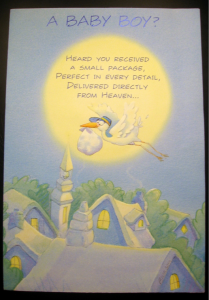
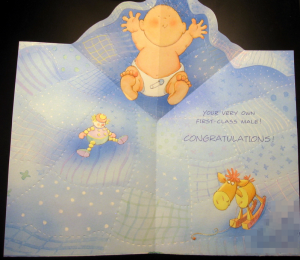
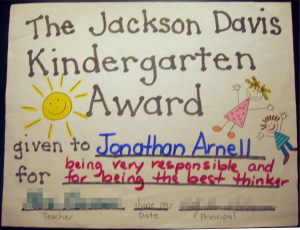
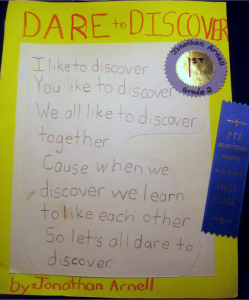
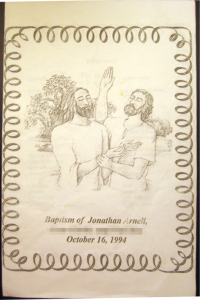

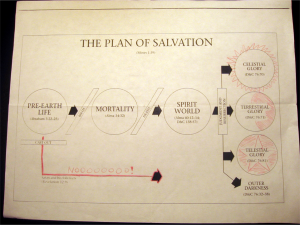
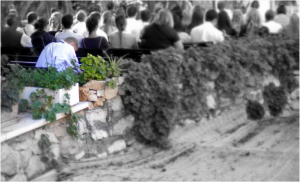
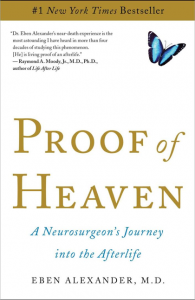
Jon- Thanks so much for sharing your thoughts. I love how you take such a thoughtful, reasoned, and loving approach. I can see why your kindergarten teacher said “you’re the best thinker”. I have a brother-in-law who is gay, and a couple of college roommates who are marrying women. I really appreciate people who can bridge that gap of understanding in a kind, civil, loving, intelligent way and I think you’re one of those people, so thanks. It’s taken me about 6 months to come to any conclusion about the Policy change in November, and I appreciate your meta analysis :). I’d love to hear more about your personal story and how you experience life as a gay mormon,
Emma
Jonathan,
This is a great article ! I was able to read it late last night after returning from the Affirmation conference. I wish I had read it before I went . I believe that I had an opportunity to talk with you there. Had I read this I would have told you personally how great it is 🙂
It helps put thoughts I have had myself in order . Thank you !